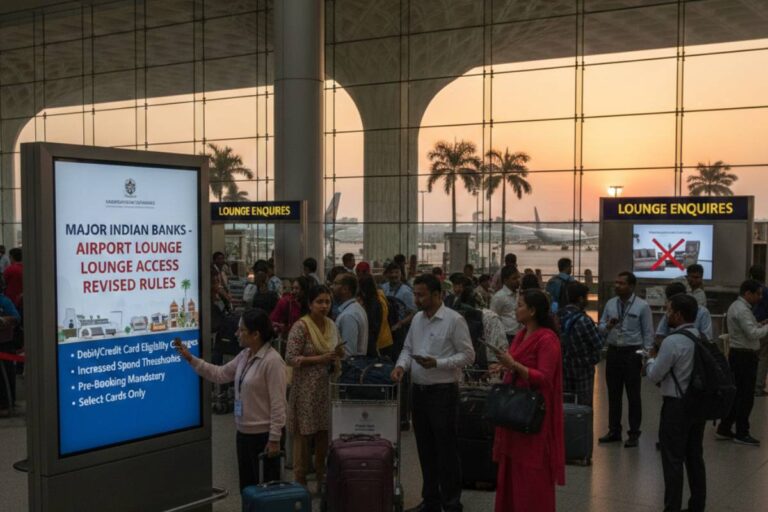Reliance Industries Limited has said it will follow new Western sanctions that target Russian oil imports. This is a big change in the way the energy giant gets its crude oil. The company said on Friday that it is looking into the effects and will change how the refinery works as needed.
This comes just days after the US put sanctions on Russia’s two biggest oil companies. The effects are already being felt in energy markets around the world.
Sanctions Are Aimed at Russia’s Big Oil Companies
The US Treasury Department put sanctions on Rosneft and Lukoil, Russia’s two biggest oil companies, on October 22. This meant that Americans and American businesses could no longer do business with them. If a company from outside the US is found to be doing business with one of these sanctioned companies or their subsidiaries, it could also face penalties.
The Trump Administration’s action is one of the harshest yet against Russia, and it is meant to force Moscow to agree to a ceasefire in Ukraine. Scott Bessent, the Secretary of the Treasury, didn’t hold back: “Now is the time to stop the killing and for an immediate ceasefire… Because President Putin won’t stop this pointless war, the Treasury is punishing Russia’s two biggest oil companies that pay for the war machine.”
The UK has joined the US in taking action, and the EU has also said it will limit the import of crude oil from Russia and the export of refined goods to Europe. The US Treasury Department says that all current transactions between Rosneft and Lukoil must be finished by November 21.
Reliance’s Answer and Promise to Follow the Rules
A spokesperson for Reliance Industries said in a statement on X that the company is aware of the new restrictions and is looking into what they mean, including any new compliance requirements. “We will follow the EU’s rules for bringing refined goods into Europe. Whenever there is any guidance from the Indian Government in this respect, as always, we will be complying fully.”
The oil-to-telecom company said it would follow all relevant sanctions and rules while also promising to protect India’s energy security. Reliance said it would make changes to how its refineries work to follow the new rules for sanctions compliance.
“Recalibration of Russian oil imports is still going on, and Reliance will fully follow GOI (Government of India) guidelines,” the company said. This is a big change for Reliance, which has been India’s biggest buyer of Russian crude oil up until now.
India’s Reliance on Russian Oil
In 2025, Russia will send India about 1.7 million barrels of crude oil per day, which is nearly a third of India’s total crude oil imports. About 1.2 million barrels per day of this volume came straight from Rosneft and Lukoil. Most of these volumes were purchased by private refiners, Reliance Industries and Nayara Energy, with smaller allocations to state-owned refiners.
India bought a lot of Russian oil after Western countries imposed sanctions on Moscow for invading Ukraine in February 2022. India’s biggest oil supplier is now Russia, which went from only 1.7% of India’s total oil imports in 2019–20 to 40% in 2023–24.
The main reason?
Sales. Russian barrels were sold for much less than Brent crude, sometimes $8 to $12 less per barrel. However, those discounts have since shrunk to about $3.50 to $5 per barrel.
How It Affects Reliance’s Business
Reliance’s crude sourcing strategy, which has relied heavily on discounted Russian barrels since mid-2022, is facing a big problem because of the sanctions. Reliance runs the Jamnagar refining complex in Gujarat, which is the largest in the world and can process 1.4 million barrels of oil per day.
India’s biggest buyer of Russian crude is the company, which has a long-term deal with Rosneft to buy almost 500,000 barrels per day. The Financial Times heard from sources close to the situation that Reliance will “recalibrate” its imports to follow the rules set by the Indian government.
Reliance usually doesn’t buy crude oil from companies that are under US sanctions, and it’s unlikely that they would risk getting more US sanctions by continuing to buy oil from Rosneft, since the Indian company is a publicly traded company that can use US banks. Experts in the field say that Reliance’s gross refining margins could drop by $3 to $5 per barrel in the near future if it can’t get Russian supplies.
R. Ramachandran, who used to be the director of refineries at Bharat Petroleum Corporation Ltd., said:
“Russian grades gave Reliance flexibility and a big price cushion. Without them, the feedstock basket costs more, which makes it harder to compete in exports.”
Effects on the Market and Other Sources
According to the sanctions timeline, all companies around the world must finish all cargo receipts and payments by November 21. This means that new shipments from Rosneft or Lukoil to India are not possible, since it usually takes about a month for Russian shipments to get to India.
What refiners need to do now:
- Cancel shipments in November and December
- Find replacements for about 1 million barrels of crude oil per day that Rosneft and Lukoil ship to India
- Explore optional volumes under West Asia term deals
- Look for spot cargoes from the US, Brazil, and other places
“It may be expensive, but we should be able to handle it. Russia only makes up about 20% of our crude,” said an executive at a state refiner. He also said that imports in December shouldn’t be too affected.
Another executive said: “Sanctions will hurt, but they may not hurt margins too much because oil prices are still in the $60s and crack spreads are good.”
The effects will be much worse for private companies like Reliance Industries, which gets almost half of its crude oil from Russia, and Nayara Energy, which only gets its oil from Russia. Reliance buys most of its Russian goods directly from Rosneft under a long-term deal. State-owned companies mostly get their goods through traders.
What Happened to Oil Prices
Early on October 23, oil prices went up 5%, with WTI going over $60 per barrel and Brent going over $65 a barrel. The market is worried that the supply of Russian oil will drop and that Indian refiners will need time to adjust. Russia is India’s biggest supplier of crude oil, accounting for a third of all Indian crude purchases.
Refiners and analysts say that the amount of Russian crude oil that goes to Indian refiners could drop sharply after the US sanctions.
Sumit Ritolia, Kpler’s head of refining and modeling, said: “Russian crude flows should stay between 1.6 and 1.8 million barrels per day until November 21. After that, direct volumes from Rosneft and Lukoil are likely to go down as Indian refiners try to avoid any risk of US sanctions.”
Reliance’s Refining Skills
Reliance’s high-complexity refining setup lets it process heavy and sour crudes from a number of sources. This ability will now be put to the test. The Jamnagar refinery sent about 67% of its output to other countries. In June, it imported 746,000 barrels of Russian oil every day, which was more than half of its 1.36 million barrels per day capacity.
“RIL can change direction faster than state refiners, but the economics will change,” said Sumit Ritolia. “Changing Russian barrels for Middle Eastern or Latin American grades will raise the price of crude by at least $2–3 per barrel, and some of those grades are harder to get.”
Things India Needs to Think About for Energy Security
Despite US pressure, India has stayed strong in keeping its energy security at home. In September, Indian private companies like Reliance Industries increased their imports from Russia to make up for a 45 percent drop by state-owned companies.
Key developments:
- Reliance Industries brought in 850,000 barrels of Russian crude oil every day in September, more than twice as much as the 420,000 barrels it brought in January
- Nayara Energy increased its imports to almost 400,000 barrels per day, the highest level seen this year
- India’s state-owned refiners cut their imports of Russian crude by more than 45% between June and September 2025
This drop happened because the discounts were getting smaller, going from $2 to $3 per barrel below Brent benchmarks, and there were supply risks because Ukrainian drones were hitting Russian refineries.
Problems With Payment
Payment is the biggest problem that is stopping the Russian oil trade from going on. “We can’t deal with sanctioned entities,” a refinery executive said plainly.
The sanctions stop Rosneft and Lukoil’s assets from moving in the US and stop US citizens from doing business with them. The Office of Foreign Assets Control has blocked all businesses that are owned 50% or more by Rosneft and Lukoil, no matter what.
A Look Back in Time
After February 2022, India’s relationship with Russian oil changed a lot. India used to get two-thirds of all its crude oil from Middle Eastern countries like Iraq, Saudi Arabia, and the UAE. After the West imposed sanctions on Moscow because of Ukraine, India started buying Russian oil at a lower price.
In FY25, India bought 88 million tonnes from Russia out of a total shipment of 245 million tonnes. In the first half of 2025, Russia was still India’s top oil supplier, providing about 35% of the country’s total imports. Iraq, Saudi Arabia, and the United Arab Emirates were next in line.
Looking Ahead
Analysts say that the sanctions could have a big effect on Reliance’s strategy for getting crude oil in the future. Vivek Dhar, who is in charge of energy research at the Commonwealth Bank of Australia, said that the discounts on Russian oil “have been the single biggest factor keeping Asian refining margins high over the past two years.”
According to trade sources, Reliance is likely to go back to getting oil from its usual Middle Eastern sources. The Jamnagar facility of the company is very complex and can handle different types of crude oil, which gives it some leeway in the transition.
Russian crude flows should stay between 1.6 and 1.8 million barrels per day until November 21. After that, however, direct shipments from Rosneft and Lukoil are likely to go down. Indian refiners will look for optional volumes under West Asia term deals and spot cargoes from the US, Brazil, and other places to make up for the shortfall.
The United States has moved up to fifth place among oil suppliers to India, up from sixth place last year. India wants to buy more goods from the US because it is trying to get a trade deal with Washington that will let it avoid high US import tariffs.
What the Government Does
Reliance made it clear that it will follow any instructions from the Indian government. The company said, “Reliance has always worked toward the goal of ensuring India’s energy security.”
This method shows how Indian businesses have to carefully balance:
- Their business interests
- They need to follow international sanctions
- They need to protect the country’s energy security
The sanctions are a big step up in the West’s efforts to cut down on Russia’s energy income. The US Treasury Department said that these actions greatly raise the risks of sanctions in the Russian oil trade.
Treasury Secretary Janet Yellen said: “The United States is taking broad action against Russia’s main source of income for its brutal and illegal war against Ukraine.”
Changes Across the Board
After both companies were sanctioned, Indian state refiners are going over their Russian oil trade documents to make sure that no oil will be coming directly from Rosneft and Lukoil. The recalibration affects all of India’s refining industry, not just Reliance. Over the past three years, the industry has become dependent on cheap Russian barrels.
The transition period will put Reliance’s ability to adapt and stay financially strong to the test. The company’s statement suggests a practical approach: looking at the effects, making sure everyone follows the rules, and changing operations as needed while still being committed to India’s energy security.




















